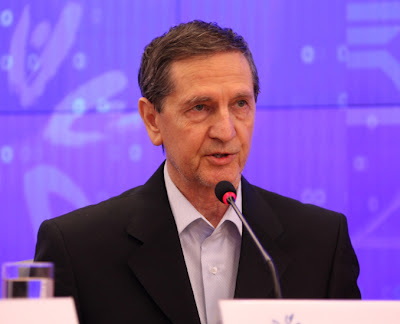 |
| Andrei Rodionenko at a recent press conference in Moscow. |
Russian head coach Andrei Rodionenko talks with Mila Volkova of Championat, translated here by Lupita.
It’s
now less than a month before the beginning of the London Olympics. The mystery surrounding
the composition of the national team remains unveiled. The Russian Cup was held
in Penza on June 17. Seven gymnasts are now competing for five spots. Championat.com’s
correspondent asked national coach Andrei
Rodionenko the reasons for this selection and the level of our gymnasts in
the international arena.
Andrei Fiodorovich, could you assess our teams’
performance at the Russian Cup?
Now all gymnasts are at the form
foreseen for this period of preparation for the Olympics. Within a week another
mock competition will take place. It will allow us to name the Olympic team.
Currently seven gymnasts are training. We’ll have to select five out of those
seven.
Why was then this tournament indispensable?
Based
on the results of the Russian Cup, we selected five gymnasts and two alternates.
The aim was to have six gymnasts, and now we will select five. This is the
principle we followed for the selection: every competition excludes some
gymnasts or confirms their spot on the team. We start from 14 candidates to
name the five members of the Olympic team, who perform consistently at a high
level according to the requirements of the next competition.
Why do we need such a complex system of selection?
We’ll
name the team after July 8th. The reason is simple. At the European
Championships and at Worlds, we compete with alternates. At the Olympics, only five compete. Alternates are not even allowed in the Olympic Village. This is why
our selection process is so accurate. When we travel to London, all of them
have to be in good condition, healthy and able to perform their routines. The
framework is such that we have no right to make mistakes.
Are you focusing on the all-around or on events?
First, we select the best gymnasts
according to the 5-4-3 formula: five for the team, four competing, three
counting. We select the best. They’ll prove now who the best is. For instance,
the girls have three all-arounders: Mustafina, Komova and Grishina. If there’s
a fourth one, the better. If they can cover all the spots, why not? Although not
all of them can compete in the all around and in individual events, somebody
will have to compete in both. This is not our initiative. The format of the
competition dictates those rules.
Absolutely. Currently, we want to obtain the maximum number of events from three or four gymnasts and to complete them with the best event gymnasts. Our task is not a simple one: qualification, team final, all-around final and event finals. The five gymnasts have to comprise our best gymnasts. With a seven gymnast team, all of them would compete. They are all ready. The problem is to include the potential of seven gymnasts in a team of five.
What is the level of difficulty of our gymnasts compared to their rivals?
The level of all the leaders is more or less identical. The problem is consistency and the quality of execution. For instance, we have floor at the highest level. All in all, we have a good level in every apparatus.
How has the quality of the execution improved after the European Championships, where not everyone could perform the announced difficulty?
The European Championships were the first test. Now we have to prove ourselves again and again. This is the method of our preparation. Some things went well, other things failed. We have introduced corrections. How can we find the best balance? Only at home? At home you can do everything, but when one performs in a competition, unforeseen things happen. We really want to show the best, the most complex routines, and all this is to be done with five gymnasts.
Is Denis Ablyazin going to perform his mega floor routine and can he do it in London?
He performs it, but not every time. It’s like running 100 meters in nine seconds; you don’t achieve that every day. Even Usain Bolt had a false start. This is why, when we deal with a major competition, any detail is significant and the result doesn’t always coincide with what has been planned. Currently, we’re trying to increase the level of confidence and, at the same time, not to lose complexity. We have to reach the optimal condition when a gymnast is able to perform at this best, and this is complex.
In the qualifying trial, he performed an easier routine. At the London Olympics are you going to follow this approach or are you going for everything?
Yes, it was the second day of the trials, the team competition. And we went for a simpler, more consistent routine. As far as London is concerned, it will depend on how he performs this routine. He has the world’s most difficult routine. It all depends on consistency.
Photograph of Andrei Rodionenko courtesy of the Russian Gymnastics Federation.
Thanks for the translation Lupita and thanks for the post.
ReplyDeleteI prefer when Andrei speaks instead of the other Rodionenko. He makes sense and he isn't just hyping up gymnasts. I agree with him, execution and consistency is an important thing and that's what they need to work on. Although we more or less have an idea of the team, I am still excited for when they will be announced.
Down to 7 gymnasts now? Who else is out after injured Sidorova?
ReplyDeleteI wouldn't worry about this too much - the Russians will announce their final five on the 8th.
Delete